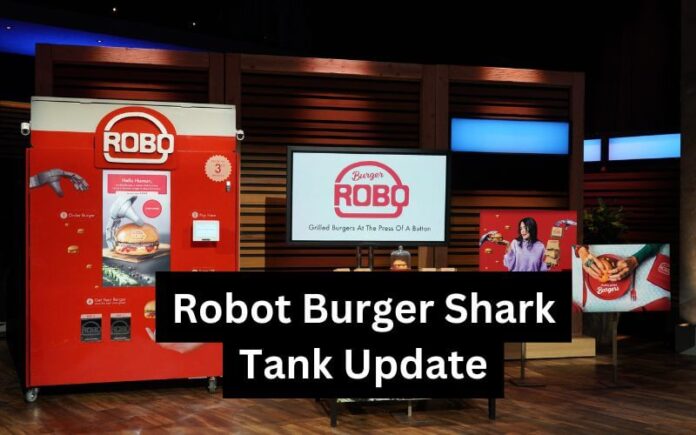In today’s fast-paced world, convenience is highly valued, and the food industry is no exception. Enter RoboBurger, an innovative concept introduced by entrepreneurs Audley Wilson, Andy Siegal, and Dan Braido, which aims to transform the fast-food landscape with its autonomous burger vending machine. In this blog post, we will explore RoboBurger’s journey on Shark Tank, the investment deal it secured, its business model, and the potential future of robotic fast food.
The Robot Burger Pitch and Deal at Shark Tank
The RoboBurger concept was presented to the sharks as a revolutionary burger vending machine capable of preparing a fully assembled burger in under four minutes. This includes grilling the patty, toasting the buns, adding condiments, and boxing the burger – all without human intervention.
They asked $1.5 million for 5% equity for his company. Despite some skepticism from the sharks regarding the business model and the viability of robotic food vendors, RoboBurger managed to secure an investment from sharks Kevin O’Leary and Michael Rubin. The deal involved a $1.5 million loan in exchange for 9% equity in the company.
Robot Burger Is Gone Out of Business
Yes, Robo Burger is still in business. Since its appearance on Shark Tank, RoboBurger has continued to evolve and improve its technology. The company is still operational, and the autonomous burger machines are now capable of making plant-based burgers and breakfast sandwiches. RoboBurger’s persistence and dedication to innovation have enabled it to stay in business, despite the challenges and skepticism it faced.
What Was Robot Burger’s Net Worth?
As a private company, RoboBurger’s net worth is not publicly disclosed. However, the investment deal secured on Shark Tank, which valued the company at around $16.7 million, gives us an indication of its potential worth. As RoboBurger continues to expand and lease its machines, its net worth may increase accordingly.
Impact of Shark Tank on Robot Burger
Appearing on Shark Tank has had a significant impact on RoboBurger. The company not only secured a substantial investment deal, but it also gained significant exposure and credibility. This has allowed RoboBurger to attract potential clients and further develop its technology. The company now faces a promising future, thanks to the support and guidance of its investors.
Is RoboBurger profitable?
RoboBurger’s business model revolves around leasing its machines to other brands. The lease fee is $3,000 per month per machine, not including the cost of food. The burgers retail for between $5.99 and $6.99, with a production cost of just under $3 per burger.
Although the profitability of RoboBurger depends on various factors such as the number of machines leased, the company’s ability to secure an investment deal on Shark Tank suggests that its profitability potential is promising.
Business Overview
RoboBurger’s primary offering is its innovative autonomous burger vending machine. By leasing these machines to other brands and businesses, the company generates revenue while providing a convenient and efficient food service to consumers.
As RoboBurger continues to refine its technology and expand its offerings, it is well-positioned to capitalize on the growing trend of automation in the food industry.
Future Plans for Robot Burger
RoboBurger’s future plans involve further development and refinement of its technology, as well as expanding its offerings to include more plant-based options and breakfast sandwiches. The company also aims to increase the number of machines leased to clients, thereby boosting its revenue and overall impact on the fast-food landscape.
With the backing of influential investors and a unique, innovative product, RoboBurger has the potential to revolutionize the fast-food industry and carve out a niche in the ever-evolving world of automated food service.
Conclusion
RoboBurger’s journey on Shark Tank has been a testament to the power of innovation and persistence. Despite initial skepticism, the company managed to secure a significant investment deal and continues to operate, proving that there is a place for robotic fast food in the market.
As RoboBurger continues to grow and improve its technology, it has the potential to disrupt the fast-food industry and change the way we view convenience in food service.
Also Read:
